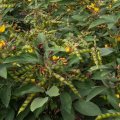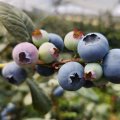The effect that global warming will have on plants is now better understood thanks to advanced modelling provided by The University of Queensland’s (UQ) Professor Graeme Hammer, one of Australia’s leading crop scientists.
For more than a decade, the professor in crop science at UQ’s Queensland Alliance for Agriculture and Food Innovation (QAAFI) has been developing increasingly sophisticated computer models to predict the growth and yield of agricultural crops.
In a paper published this week in Nature Climate Change, Professor Hammer and his colleagues have demonstrated that the anticipated increase in temperature associated with global warming is not directly linked to an expected decline in yield.
Previously it has been accepted wisdom that the yield losses being experienced by maize growers during hot seasons in the American mid-west were attributable to temperature increases.
The modelling study has shown that it is the associated increase in the evaporative demand for water – causing increased plant water use – that will ultimately cause the decline in crop yield.
It is not a direct effect of heat stress on plant organs from the increase in temperature.
“These two factors are often related, but until now we were simply attributing projected yield declines to increases in temperature and heat stress – and it’s more complex than that,” Professor Hammer said.
“Our computer models are able to separate the mechanisms and explain what is actually going on.
“Increasing temperatures mean increasing demand for water and so greater plant water use and ultimately more water stress during the crop life cycle.
“A good human analogy would be to imagine someone standing in a desert.
“You would start to sweat more as the temperature increased and more rapidly use up your reserves of water.
“It’s a relatively simple concept, but one that has been overlooked until now.”
Being able to accurately predict declines in the maize harvest and explain their physiological basis is a reassuring validation of Professor Hammer’s crop models.
Historical data used in the study was drawn from locations across the American mid-west spanning nearly 50 years.
A preview of the Nature Climate Change paper, The critical role of extreme heat for maize production in the United States, is available online at http://goo.gl/8VyzL
Media: Graeme Hammer, 07 3346 9463, g.hammer@uq.edu.au or QAAFI Communications, 0417 425 510
QAAFI background
Established in October 2010, the Queensland Alliance for Agriculture and Food Innovation (QAAFI) is an institute of The University of Queensland (UQ), which was formed through and alliance between UQ and the Queensland Government's Department of Agriculture, Fisheries and Forestry (DAFF).
Originally QAAFI drew together some 100 research teams specialising in plant, animal and food sciences from twelve UQ and DAFF sites across Queensland.
QAAFI's long-term goal is to improve the competiveness and sustainability of tropical and sub-tropical food, fibre and agribusiness sectors through high-impact science.
Through science and innovation, the institute pursues research and collaborations that will lead to sustainable agriculture and food. Our objective is to be a world leading research institute in plant science, animal science, and nutrition and food sciences, delivering outcomes in discovery, learning, and engagement.
.jpg)










